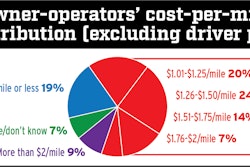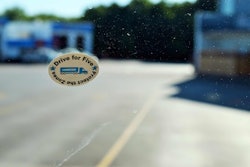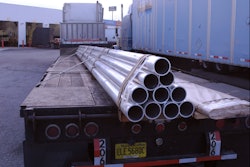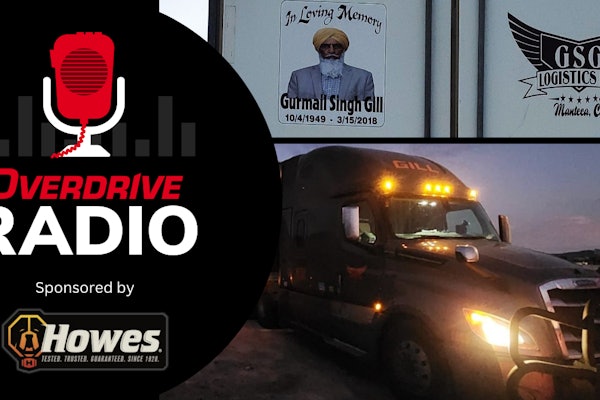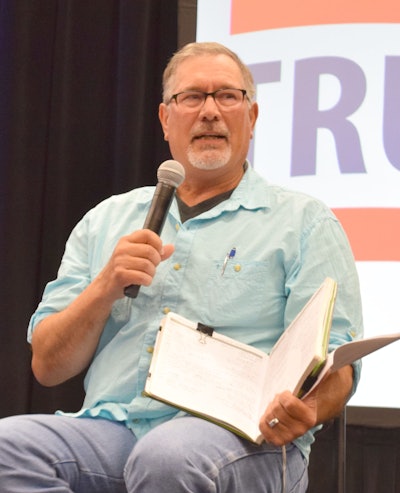
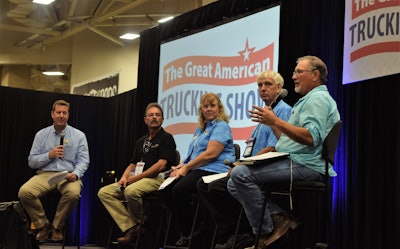 Panelists in the Partners in Business seminar around owner-op best practices on the final day of the Great American Trucking Show in Dallas, from left: ATBS’ Matt Amen (moderating the discussion), small fleet owner Les Willis, expediters Linda and Bob Caffee, and Overdrive contributor and owner-operator Gary Buchs.
Panelists in the Partners in Business seminar around owner-op best practices on the final day of the Great American Trucking Show in Dallas, from left: ATBS’ Matt Amen (moderating the discussion), small fleet owner Les Willis, expediters Linda and Bob Caffee, and Overdrive contributor and owner-operator Gary Buchs.Les Willis, owner of a four-truck fleet, recalled asking a former employer how to get rich. “He said, ‘Watch what rich people do and do the same thing.’”
Willis, serving on an owner-operator panel at the Great American Trucking Show in Dallas, pointed to the success of his fellow panelists as a good way to apply that advice. Those panelists took a broader approach to watching others, noting the importance of networking, asking key questions of experienced operators, and reading.
The panel was one of four GATS seminars presented by Overdrive’s Partners in Business, which is sponsored by TBS Factoring Service. PIB is produced in conjunction with ATBS, the nation’s largest owner-operator financial services provider.
Expediter Bob Caffee also had wisdom from a former employer to pass on: “He said if you don’t learn something new every day, it’s time for you to die because you know everything.” One way to maintain daily learning is through audio books, he said, since “you can learn while you drive.”
Addressing the session’s topic of best practices for owner-operators, the panelists also agreed that controlling costs is perhaps the most effective strategy for succeeding as a trucking business. Not only does every saved dollar go directly to the bottom line, but many costs fall in areas that owner-operators have the most control over.
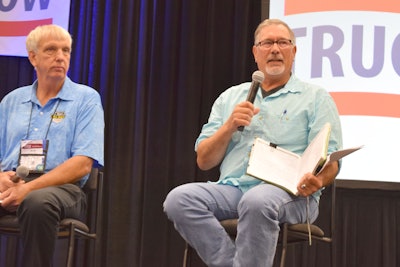 Panelist Gary Buchs shows the audience his current hand-written business log. He says he’s benefited in more ways than one from recording certain details about every load he’s ever hauled. “I’ve got stacks of these things in the basement,” he said. At left is expediter Bob Caffee.
Panelist Gary Buchs shows the audience his current hand-written business log. He says he’s benefited in more ways than one from recording certain details about every load he’s ever hauled. “I’ve got stacks of these things in the basement,” he said. At left is expediter Bob Caffee.“It’s not so much truck spending,” said Gary Buchs, the 2016 Owner-Operator of the Year, but “discretionary spending.” For example, a driver might feel that an expensive steak dinner is fine after a hard day’s work because “I deserve it.”
Linda Caffee, Bob Caffee’s wife and team-driver with Landstar Express America, echoed how easy it is to indulge in unwise personal spending. “You don’t need that million-dollar pickup in the driveway because you’re not going to be there to drive it,” she said.
Among the panelists’ trucks, “nothing is attached that’s not profitable,” Willis said. It’s easy to rationalize add-ons that have some practical value, like a herd guard for someone who runs in remote rural areas, but the operational cost of a heavy accessory can overshadow its usefulness. When considering such purchases, he said, “Everything you do, you do to affect your bottom line.”
The panelists were strong on collecting key operational data and knowing how to use it. Linda Caffee says she logs everything into a spreadsheet. Because it’s a google doc, it’s stored in the cloud, so if she’s at home while Bob’s on the road, they both have access to it and can see the other’s most recent additions.
The panelists stressed focusing on smart load choices and examining numbers closely to ensure profitable runs rather than striving to run as many miles as possible.
“You never heard anybody up here say I ran 6,000 miles this week,” Willis said. “It’s not about the miles.” Instead, he averages revenue and costs from multiple loads to make sure each truck gets an adequate return on investment. “I don’t have to have that home run,” he said.
 Overdrive’s Partners in Business is sponsored by TBS Factoring Service.
Overdrive’s Partners in Business is sponsored by TBS Factoring Service.Buchs says he has filled many hand-written notebooks that record “every load I’ve hauled, the date, brokerage, customer, contacts.” If he needs a contact in an area where he hasn’t delivered in years, he can readily find it. “When we write things down by hand, we remember them,” he said. “It’s like muscle memory.” He also highlights maintenance items in the logs.
Failure to save for maintenance and repairs is the biggest cause of failure for owner-operator businesses, said panel moderator Matt Amen, an ATBS vice president. Second is lacking health insurance or other means to care for the operator’s health. Third is failure to pay taxes and otherwise manage the business well.
Panelists agreed it’s wise to budget for repairs and routine maintenance separately. “Repairs are things you don’t expect,” Bob Caffee said. At the same time, many repairs can be roughly anticipated, so it’s wise to consider a part’s predicted lifespan, he said. “If you’re getting close to its expected life, do you replace it whether you need to or not?”
Caffee and Buchs said replacement is usually the wise choice. “The $400 I’m going to spend could save me $1,000 in a roadside call,” Buchs said, not to mention the cost of downtime.


